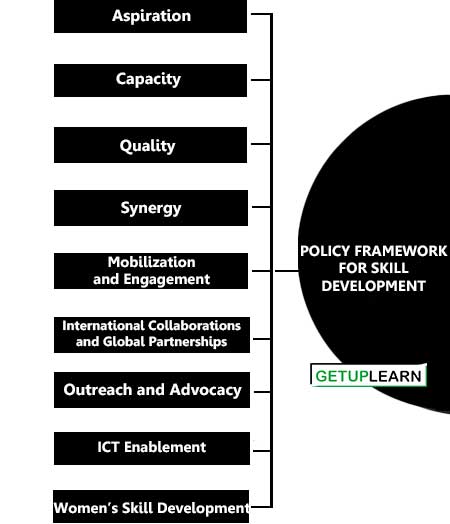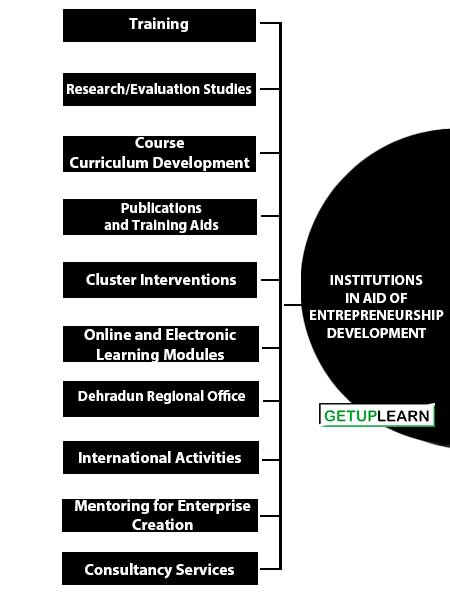Table of Contents
- 1 What is NSPD?
- 2 Policy Framework for Skill Development
-
3 Institutions in Aid of Entrepreneurship Development
- 3.1 Training
- 3.2 Research/Evaluation Studies
- 3.3 Course Curriculum Development
- 3.4 Publications and Training Aids
- 3.5 Cluster Interventions
- 3.6 Online and Electronic Learning Modules
- 3.7 Dehradun Regional Office
- 3.8 Mentoring for Enterprise Creation and Employment Assistance to Trainees
- 3.9 International Activities
- 3.10 Consultancy Services (National and International)
What is NSPD?
The National Policy on Skill Development was initially created in 2009, and it served as a foundation for skill development efforts throughout the country.
Modifications in the macro environment, as well as lessons learned through the implementation of various skill development programs in the country, have forced policy changes over time.
As a result, the National Skill Development Policy of 2015 was created, succeeding the 2009 Policy. On July 2, 2015, India’s first Integrated National Policy for Skill Development and Entrepreneurship was announced.
Vision: To develop an ecosystem of empowerment by skilling on a broad scale, quickly, and to encourage a culture of innovation-based entrepreneurship that can generate wealth and jobs, ensuring sustainable livelihoods for all citizens in the country.
Policy Framework for Skill Development
- Aspiration
- Capacity
- Quality
- Synergy
- Mobilization and Engagement
- International Collaborations and Global Partnerships
- Outreach and Advocacy
- ICT Enablement
- Women’s Skill Development

Aspiration
Skill Development is motivating for our country’s youth.
Capacity
It is produced by private sector training organizations, industrial in-house training, government and private ITIs, tool rooms, and Multi Skilling Institutes in schools, colleges, and polytechnics (MSIs).
Quality
The competency outcomes and employability of learners can be used to assess training quality. For quality improvement, the following parameters have been established.
- The National Skills Qualifications include a quality assurance framework.
- National Skill Qualification Framework (NSQF) Market- relevant training programs
- Encouraging skilled workforce mobility both laterally and vertically.
- Prior learning is acknowledged.
- Curriculum coherence.
- Soft skills and computer knowledge.
Synergy
The qualifying criteria, duration of training, maximum money for training, outcomes, and monitoring and tracking mechanisms for various Central Government Ministries, Departments, and Agencies’ Skill Development Programs vary.
Mobilization and Engagement
Industry must play a key role in ensuring that skilled workers have job prospects.
International Collaborations and Global Partnerships
The fundamental goal of international collaborations and global partnerships is to harness best practices from around the world.
Outreach and Advocacy
Connecting supply and demand is one of the most difficult tasks in the skilling industry. A Labor Market Information System (LMIS) will be established to, inter alia, function as an aggregator of both skill demand and supply, thereby removing information asymmetry in the market and assisting in the connection of supply and demand.
ICT Enablement
Only promoting brick-and-mortar facilities would not allow for the pace and scale needed to change skill development activities.
Women’s Skill Development
Mobile training units, flexible afternoon batches, and training tailored to the local needs of the area will be adopted to ensure women’s involvement and mobilization. The establishment of Kaushal Vardhan Kendras (KVKs) at the Panchayat level would be encouraged by state governments.
Institutions in Aid of Entrepreneurship Development
The National Institute for Entrepreneurship and Small Business Development is a flagship agency of the Ministry of Skill Development and Entrepreneurship, dedicated to promoting entrepreneurship and skill development through training, consulting, and research.
Training of Trainers, Management Development Programs, and Entrepreneurship cum-Skill Development Programs, Entrepreneurship Development Programs, and Cluster Intervention are some of the Institute’s main operations. Under the auspices of the Ministry of External Affairs, the Institute has been actively offering International Training for ITEC nation participants. Since 2007-08, the institute has been financially self-sufficient.
- Training
- Research/Evaluation Studies
- Course Curriculum Development
- Publications and Training Aids
- Cluster Interventions
- Online and Electronic Learning Modules
- Dehradun Regional Office
- Mentoring for Enterprise Creation and Employment Assistance to Trainees
- International Activities
- Consultancy Services (National and International)

Training
The Institute’s training programs include, among others, Trainers’ Training Programmes (TTPs), Management Development Programmes (MDPs), Orientation Programmes for Heads of Departments (HoDs) and Senior Executives, Entrepreneurship Development Programmes (EDPs), Entrepreneurship-cum-Skill Development Programmes (ESDPs), and specially designed sponsored activities for various target groups.
Research/Evaluation Studies
In addition to primary/basic research, the Institute has reviewed/evaluated various government schemes/programs, assessed training needs (Skill Gap studies), and conducted industrial potential surveys, among other things. The overall goal of these programs is to promote entrepreneurship throughout the country.
Course Curriculum Development
The Institute has created Model Syllabi for the organization of Entrepreneurship Development Programs. It also aids in the standardization of general training programs.
Publications and Training Aids
The Institute has published a number of books on entrepreneurship and related topics. The Institute publishes a quarterly newsletter that highlights the Institute’s activities, accomplishments, and interventions in the country’s entrepreneurial scene.
Cluster Interventions
In various roles, the Institute has been actively involved in carrying out developmental programs (Soft and Hard Interventions) in Clusters. To date, the Institute has dealt with 24 Industrial Clusters.
Online and Electronic Learning Modules
For Entrepreneurship Development Programs, the Institute has designed an E-learning Module (in Hindi and English). The Module was made available in a variety of states.
A picture of online learning is also included. Cyber Security, Communication Skills, Java, Personality Development, Mathematical Modelling, Web design, and Cloud Computing are among the institute’s modules. Employability and Life Skills, Retail and Entrepreneurship.
Dehradun Regional Office
Conducts research and provides training and consulting services to beneficiaries, particularly those from Uttarakhand and Uttar Pradesh.
Mentoring for Enterprise Creation and Employment Assistance to Trainees
The Institute mentors individuals interested in self-employment and assists them in finding suitable wage employment if they do not choose self-employment. For this reason, Rozgar Mela(s) provides a venue for prospective employees and trained personnel to interact.
International Activities
The Institute provides 8-week training programs for participants from other nations under the Ministry of External Affairs’ Fellowships: ITEC/SCAAP/COLOMBO Plan. In addition, the Institute plans and performs special/request training programs for international agencies and has provided consulting services to foreign countries, mainly in appraising the economic potential of various regions. The program is being infused with technology to ensure its survival in the aftermath of a pandemic.
Consultancy Services (National and International)
Providing entrepreneurship consulting services, mostly to MSMEs. It provides assistance and consultation to other institutions involved in entrepreneurship education, whether in the public or private sector. Advising both central and state governments, as well as foreign governments, on entrepreneurship and MSMEs.




